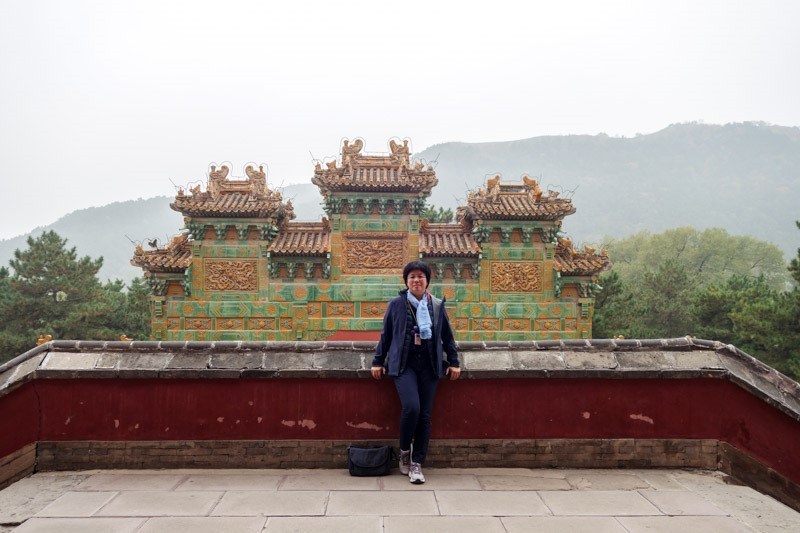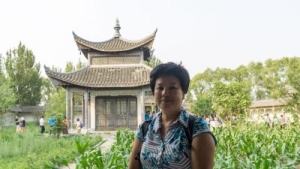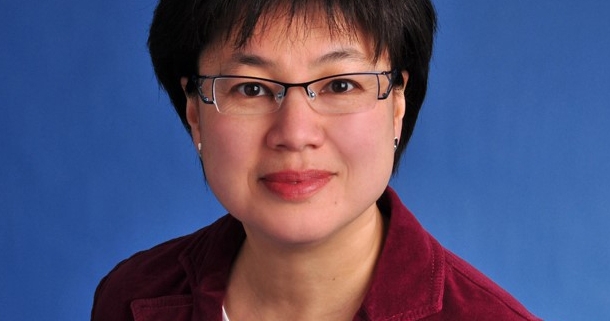Olga Stein
Climbing the Steps Back to My Past
By: Olga Stein

My teacher Sun Laoshi is going through the new words. I am having trouble with the character “上”. How is it possible that one word has opposite meanings “to go up” and “past”? Aren’t we reaching for the future when we go up?
One morning my sister called from St. Petersburg, Russia. She sounded excited. “Listen, I have been invited to give lectures at a university in China next summer. The university is in the part of the country where our parents are from. I believe it is time for you to travel home, visit our parents’ birthplaces and meet our Chinese cousins. Start working on your Chinese,” she added and hung up.
It was still dark, but my night was over.
Home. What is home?
In the mid-1950s, both my parents taught at the Shanghai University. In 1959, they were sent to the Soviet Union to accompany a group of Chinese students to study at the Leningrad State University. They brought my sister with them. My parents started teaching at the Leningrad University and eventually were offered tenured positions there. They decided to stay in the Soviet Union, where I was born. Leningrad became home to me. When my parents talked about home, it was somewhere far away. Our mother and father tried to speak Chinese to my sister and me, but we were not interested. By the time I started talking, my sister was already at school learning other languages. Chinese became “a secret language” of our parents when they wanted to talk about something that was “not for the children’s ears.”
Sometimes, our mother or father would tell us stories about their home. I felt like I didn’t belong to either the Russian world or the Chinese one.
When I was born, my parents gave me the name 瑞雪. Unfortunately, the beautiful Chinese name sounded very strange in Russian “жуйся”, which in a loose translation means “chew yourself”. Can you blame a little girl for being unhappy with such a name? “No problem,” said my parents. Next day, I went to school as Olga. Around the same time, my sister became Tatiana.
And so was my childhood far away from my parents’ home. We with our new Russian names. we went to an English-Russian bilingual school. At home, we ate Chinese food, celebrated Chinese New Year, and made hundreds of dumplings sitting around the kitchen table. A family of four is perfect for a game of mahjong. Sometimes, our mother or father would tell us stories about their home. I felt like I didn’t belong to either the Russian world or the Chinese one. Who am I? “You are what you are,” my parents replied. That was not very helpful, but I didn’t push.
In college, my sister chose to focus on Chinese Studies. She is now one of the leading scholars in the field of the Manchu history and language. In this capacity she often travels to China. She has also kept up with our relatives there.
I, on the other hand, moved in a different direction. I came to the United States to pursue graduate studies in business. And this is when the magic happened: I found home in America! Later I learned there was no magic at all. It was a typical phenomenon of a third culture person, but it didn’t matter. I was home.
That is, until the morning my sister called.
 I grew up in the family where the youngest child is loved and pampered but is also expected to respect and obey the wishes of the elders. In the morning, I did as my sister told me. I called all Chinese language schools in Manhattan listed on Google. The only school that answered the phone turned out to be the Confucius Institute (CI) at Pace University. A very friendly person on the phone invited me to stop by and meet the CI teachers. There was a staff meeting going on when I came to my CI the first time. The atmosphere was very warm and friendly. I instantly felt welcome. I loved that from the first moment everyone called me 庞瑞雪. Coincidently, my first teacher at the CI, Li Laoshi, was from Shenyang, the same city where my cousins live. We have become friends. I call her Yilin now. Yilin reminded me of my father. “Memory is the key to the knowledge,” my father used to say. We also had a lot of fun together. When Yilin’s mother visited her in New York, we spent hours playing mahjong. Shenyang rules, of course!
I grew up in the family where the youngest child is loved and pampered but is also expected to respect and obey the wishes of the elders. In the morning, I did as my sister told me. I called all Chinese language schools in Manhattan listed on Google. The only school that answered the phone turned out to be the Confucius Institute (CI) at Pace University. A very friendly person on the phone invited me to stop by and meet the CI teachers. There was a staff meeting going on when I came to my CI the first time. The atmosphere was very warm and friendly. I instantly felt welcome. I loved that from the first moment everyone called me 庞瑞雪. Coincidently, my first teacher at the CI, Li Laoshi, was from Shenyang, the same city where my cousins live. We have become friends. I call her Yilin now. Yilin reminded me of my father. “Memory is the key to the knowledge,” my father used to say. We also had a lot of fun together. When Yilin’s mother visited her in New York, we spent hours playing mahjong. Shenyang rules, of course!
The texts I drilled with Yilin were very helpful on my first trip to China. Since then, I have traveled to China several times. My cousins took me to the Taoist temple built by our great grandfather and expanded by our grandfather. I felt at home.
I get it! Learning Chinese for me is like 上去, i.e., climbing the steps getting closer to my past. There is an old Chinese saying: 落叶归根 (Fallen leaves return to the roots).
Olga Pang Stein
Confucius Institute at Pace University
Business Consultant
New York, New York
Olga Pang Stein is a global executive coach and a trainer currently based in the United States. Olga has coached team leaders and managers at various levels, including C-level executives, as well as multicultural teams within organizations, such as Lufthansa Technik AG, Deutsche Telekom, UN Agencies, and the World Bank Group.
As a coach, Olga creates a safe space for personal discovery and building awareness for her clients. Olga’s special interest is bringing awareness and appreciation of diversity in an organization and supporting women business leaders.
Olga has served in a senior leadership position at Summit, a company that provided business liaison services for US companies operating in Russia. She has worked at the International Monetary Fund, as well as for Creditanstalt International Advisers. Before that, she was a chief negotiator for a logistical company with operations in the countries of the former Soviet Union and Eastern Europe.
Olga is fluent in English, Russian and German. She started learning Chinese in the fall of 2016.

